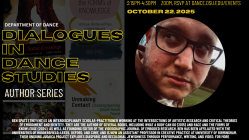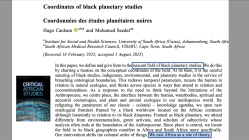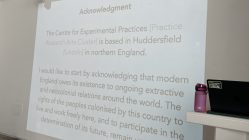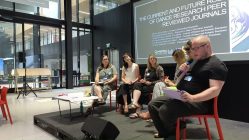Duration: 3:18
Project: Judaica
Song: A-A Lyu Lyu
Practitioner: Agnieszka Mendel
Director: Nazlıhan Eda Erçin
Videography: Ben Spatz
Date: 9 May 2017
Venue: Centre for Psychophysical Performance Research
Source File: J008-M
COMMENTARY
Eda
The way a practitioner enters and exits a song is one of the core elements of my individual research in songwork. When (and why) do we exactly start, and stop singing? This video shows the last thread of a long solo session in which I continuously propose physical and dramaturgical challenges to Agnieszka. Prior to the moment in the video, she works with the song through three affective states, namely joy, anger and fear – all dense, dynamic and highly energetic. ‘A-A Lyu Lyu’ is a delicate lullaby that is based on repetition of a few words which allows breaths, exclamations, and gestures in between. After the pushing the possibilities of kinesthetic and associative engagement with the song, I ask Agnieszka to sing it as if this is going to be the last time she was given space and freedom to do it. I tell her to let go off the psychophysically demanding work that we have just finished, and find a way in and out of the song with the awareness that this is a farewell. I am also sitting on the floor right across her face directly looking into her eyes as she is singing. In the second of 1:45, Agnieszka finds something completely new, a high pitch entry which grabs me. She tests this vocal edge and in 2:15, she is immersed in it. All our previous work with this song is sediment underneath this particular vocal texture, she sings in and exits the song. That is the most affective moment of the session for me which I always try to re-find and revisit.
Ben
The instruction to prepare for death is probably among the oldest in all traditions of embodied practice. It links martial, healing, and performance orientations, as in the Zen story about a game of chess:
They looked at the Master’s face and saw that he meant it: he would cut off the head of the loser. Then they began to play. With the opening moves the youth felt the sweat trickling down to his heels as he played for his life. The chessboard became the whole world; he was entirely concentrated on it. At first he had somewhat the worst of it, but then the other made an inferior move and he seized his chance to launch a strong attack. As his opponent’s position crumbled, he looked covertly at him. He saw a face of intelligence and sincerity, worn with years of austerity and effort. He thought of his own worthless life, and a wave of compassion came over him. He deliberately made a blunder and then another blunder, ruining his position and leaving himself defenceless.
The Master suddenly leant forward and upset the board. The two contestants sat stupefied. ‘There is no winner and no loser,’ said the Master slowly, ‘there is no head to fall here. Only two things are required,’ and he turned to the young man, ‘complete concentration, and compassion. You have today learnt them both.
— Irmgard Schloegl, Wisdom of the Zen Masters
I often approach studio practice as preparation for death or imprisonment. This has to be done with care. I think about my own inevitable death and possible future suffering in relation to the death and suffering of others. This can’t be done instrumentally. There is no sense in feeling guilty because I am not suffering or being killed today as others are. At the same time I do not want to let myself identify too easily with those others. As embodied creatures we share a certain vulnerability, but as social beings we are divided by circumstances and hierarchies. We are connected but not the same, and the compassion described by the Zen master is both ethical and political.
Agnieszka
What I liked about this task was that Eda put the song into the spotlight as if it was a living creature or at least dramatis personae, a self existing being which accompanied me along a part of my own journey as a partner co-existing with me in theatrical space. Although I absolutely do think that songs have their own life I have just realised that I never had thought about it extensively…
The moment that Eda is describing above, the ‘high pitch entry’ was meaningful for me. Suddenly I felt like the ‘soul’ of the song is peeling off my voice, as if they were suddenly separated: the dead earthly body and the extraterrestrial subtle substance. They kept conversing for a while and then there was only the high pitch left. That was strange. Was I the dead body being abandoned by a song – a ‘creature’ with no physical body yet more durable than me?
This experience poured out a stream of philosophical thoughts. Could a song be a dybbuk? At least metaphorically – yes I definitely think so!
I learnt this song from the album Jewish Life: The Old Country, which is a collection of Yiddish secular songs of the 19th century that were brought to the United States from Eastern Europe. This particular recording, made by Ruth Rubin, captured the voice of a woman born in Zhitomir, Russia, at the moment of crooning for a baby. A voice from the past. Voice of the bygone era. Why did I choose this simple tune? What enchanted me? Now I feel like the song wanted to be sung and found a body through which could live for a while again. I wander how old was that song when sung by the Russian women while the recording was being taken? How many times has it been reincarnated?
I personally dislike my own performance in this video. It is not at all spectacular. But this experience became very meaningful to me. While I was singing goodbye to the song, the process illuminated my thoughts. My approach to songs, perceived now even more as independent and carrying their own contents ‘creatures’, expanded.
Interesting that Ben in his commentary has mentioned dying. Giving me this task, Eda did not articulate anything referring to death, she just said ‘Farewell to a Song’. But somehow, the symbolic act of dying came to me as well in that moment.
Now I would like to quote the lyrics of a song from the performance Carmina Burana, from the repertoire of the Gardzienice Theatre Company:
Farewell my friend I’m bound for Canaan
I’m travelling through the willderness
Your company has been delightfull
You who doth leave my mind distressed.
I’ll go away behind to leave You
Perhaps never to meet again
But if we ever find the pleasure
I hope we’ll meet on Caanan’s Land.







[…] 9 May farewell to a song […]